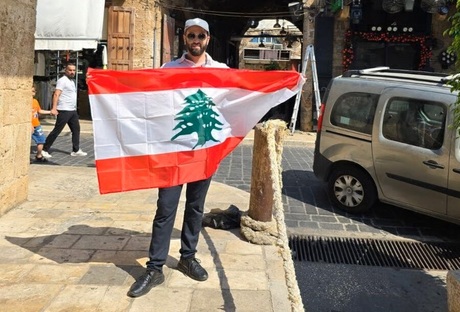Israeli dual national tours Lebanon including Hezbollah stronghold in Dahieh

Benny Wexler, an ultra-Orthodox Israeli with foreign citizenship who has visited over 100 countries, has disguised his identity to tour the Lebanese capital's Dahieh district and the city’s last remaining synagogue.
Fearing discovery, Wexler took extreme precautions to conceal his Israeli identity. “From the moment I realized I was flying to Beirut, the fear kicked in. I couldn’t sleep at night and had to take medication for the headaches,” he said. “I booked my flight through an American travel agent so my Israeli IP address wouldn’t be detected,” he added, according to Israel’s Ynet news portal.
He replaced his phone, hid his credit cards inside his shoes, and packed his Jewish prayer outfit in a plain bag with no Hebrew markings. Entering Beirut was the most stressful part, he recalled. “They checked every person for several minutes. All the tourists were from Iraq, Kuwait or Jordan — not a single one from the West. I stood out.”
According to Wexler, Beirut airport officials seemed to suspect something when they noticed his passport listed Israel’s Beersheva as his birthplace. “The officer called a supervisor, and they started discussing me,” he said.
“When I realized I was actually in Lebanon, I had to pinch myself,” Wexler said. Once inside, he discovered that 90,000 Lebanese pounds were worth just one U.S. dollar. “I hadn’t prepared a driver or hotel because I didn’t believe I’d make it in,” he said. “After entering, I booked a hotel and took a cab there.”
His hotel was not far from Dahieh, which was heavily bombarded by Israel during the 2024 war. He befriended staff members to help him find a driver who could take him to Jewish sites, a synagogue and a cemetery, while keeping his identity hidden. Eventually, he met a driver named Mohammed, who realized Wexler was Jewish but didn’t object.
“I have nothing against Jews,” Mohammed told him. “I’ll drive you for $70 a day, including taking photos.” Wexler visited the Jewish cemetery in Beirut’s Sodeco area, founded in 1829 and home to some 4,500 graves.
He met a senior member of Beirut’s tiny Jewish community, who cautiously tested his identity before accompanying him to the cemetery and warning him not to take photos. “He grew up in Lebanon and has never visited Israel — he’s forbidden to. His fear was enormous, and he advised me to leave immediately,” Wexler said.
At Maghen Abraham Synagogue, the only one left in Beirut, Wexler obtained police permission to enter. The synagogue stands in the upscale Wadi Abu Jamil neighborhood, once home to about 20,000 Jews. “Only the synagogue remains,” Wexler said. “It suffered theft and damage, and the port explosion nearly destroyed it. The rabbi was deeply moved to see me.”
Wexler also toured other landmarks, including the Mohammad Al-Amin Mosque and the restored Beirut Port.
He also explored Lebanon’s Jeita Grotto and the ancient city of Byblos. But his visit to Dahieh, Hezbollah’s stronghold, was the most nerve-racking. “Everyone warned me not to go there. No taxi driver wanted to take me,” he said. “Luckily, my driver knew the area well. I saw destroyed buildings and countless posters of (slain Hezbollah chief Sayyed) Hassan Nasrallah on the walls.”



